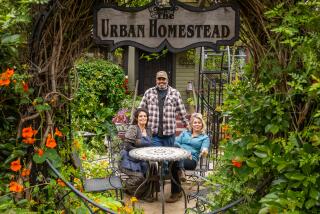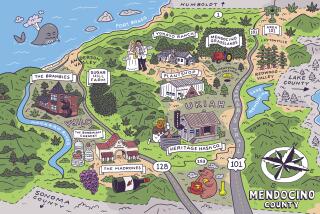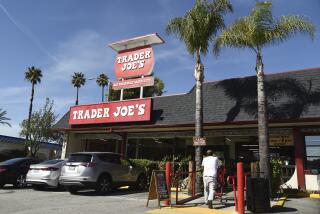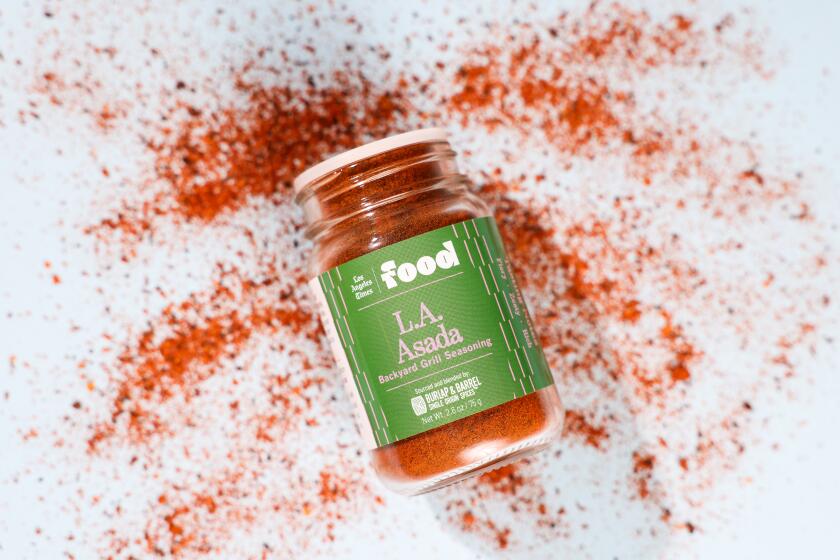Market Watch: Capay Organic expands into Southern California
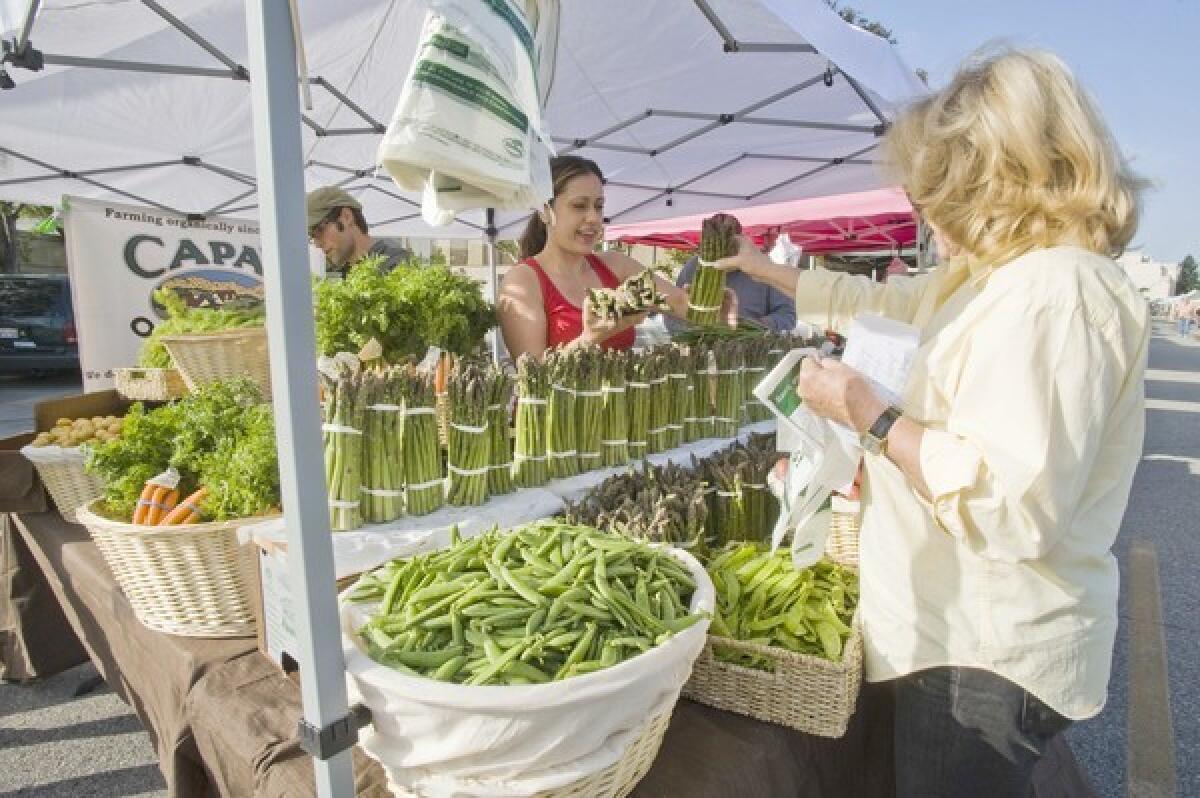
Were it not for the palm trees, it would have been easy to imagine that the Capay Organic farm stand, which started selling last Sunday at the Beverly Hills farmers market, was actually on its home ground at the San Francisco Ferry Plaza or Davis, Calif., markets. Long a familiar presence in Northern California, Capay Organic is now expanding to the Southland, bringing attractive, artfully displayed produce, but also questions about the direction in which farmers markets are headed.
Currently the farm offers aromatic baby fennel; tender sugar snap peas; fresh, beautiful asparagus (rather dear at $6 a bunch); very sweet, crisp Nantes carrots; La Ratte, French fingerling and German Butterball potatoes; and some tasty but quite salty pistachios. Quality and presentation were first-class.
Capay is a small town in Yolo County, about 30 miles northwest of Sacramento, in a beautiful valley (somewhat less tranquil since a huge casino opened) famous for organic family farms, including Good Humus Produce and Full Belly Farm. Capay Organic, founded on 20 acres in 1976 by Kathleen Barsotti and her husband, Martin Barnes, quickly acquired a reputation for quality produce. The farm was one of the first in California to establish a community-supported agriculture (CSA) program, called Farm Fresh to You, delivering boxes of fruits and vegetables to its customers.
Now their three sons, Thaddeus Barsotti (“farmer-in-chief”), Noah Barnes (sales and marketing manager) and Freeman Barsotti (CSA manager) have continued and expanded her legacy. As CSAs have become increasing popular in recent years, Capay Organic’s program has boomed, and now accounts for some 8,000 to 10,000 deliveries a week in Northern California, making it one of the largest such programs run by a farm in the region, according to Thaddeus’s wife, Moyra; the farm also sells at 15 farmers markets.
In recent years, in order to expand the supply and variety available to its customers, Capay Organic extended production to the Salinas Valley, near the Central Coast, and to the Imperial Valley, in southeastern California, where it grows melons, peppers and heirloom tomatoes.
Last September, the farm started offering a CSA in Southern California, which now makes about 2,000 deliveries per week. In the last week, the farm started selling at two local farmers markets, in Beverly Hills and at Torrance on Tuesdays, and may join several more, said Jesse Ramer, 26, who manages farmers market sales for the farm.
So far so good, but there are certain aspects that mindful shoppers may wish to consider:
•Size: Capay Organic started small, and is still family-owned, but now totals some 500 acres of land farmed either directly by Thaddeus, or by hired farmers under his direction. That’s a far cry from giant organic farms like Earthbound, but much larger than the icon of a little farmhouse on the stand’s canopy would suggest. No one should deny a family the opportunity to succeed and prosper, but when a farming operation grows bigger, it becomes harder to maintain quality at the highest level.
•Distance: Capay is 417 miles distant from Beverly Hills, which makes it very likely the most distant farm to sell fresh produce in the Los Angeles area (there are farms that sell meat, cheese, apple juice and olive oil from farther away). Certified farmers market regulations permit growers to sell from their farms anywhere within California, and some of the state’s best and most distinctive produce comes from northern growing areas, such as Gravenstein apples from Sebastopol, and Derby Blenheim apricots from Winters; but some Southland consumers may prefer more locally grown carrots or snap peas.
Capay’s CSA customers can request that their boxes contain locally grown produce, said Thaddeus in a telephone interview. Asked whether it might be helpful to shoppers for his farmers market stand to identify the growing area for individual items on its signs, he agreed.
•Multiple locations: There is a broader concern that applies to a small but increasing number of market vendors who draw from multiple farms in widespread growing areas, like Jaime Farms ( City of Industry, Chino, Yucca Valley and Santa Maria) and Tamai Farms (Oxnard and the Coachella Valley). This is permitted and provides a certain advantage to vendors, who can extend their season and the variety of their crops, from coastal raspberries to desert corn; it is particularly practical for CSAs, which seek to please their customers by consistently providing a wide range of produce.
But the appeal of farmers markets is that they allow customers to interact directly with the people who grow the food. And with farms so far distant, it might become impossible for a farmer to truly exercise hands-on control over the growing of the crops that he’s selling at the market.
On the other hand, Thaddeus said, he is closely involved in supervising the growing practices at his family’s far-flung farms, and makes sure that they adhere to growing practices, such as cover crops and crop rotation, that are not required by the letter of national organic standards, but are essential to the spirit of organic farming.
Individually, none of the three factors discussed above – large farm size, distance from markets and multiple locations – need dissuade shoppers from a vendor. There are many counter-examples of good farms that share some of these characteristics but still contribute worthily to markets. Capay Organics provides an attractive addition to farmers markets, but if more vendors combine these factors of large size, multiple locations and long distance, that would represent a substantial dilution of the core concept of farmers markets.
More to Read
Eat your way across L.A.
Get our weekly Tasting Notes newsletter for reviews, news and more.
You may occasionally receive promotional content from the Los Angeles Times.
